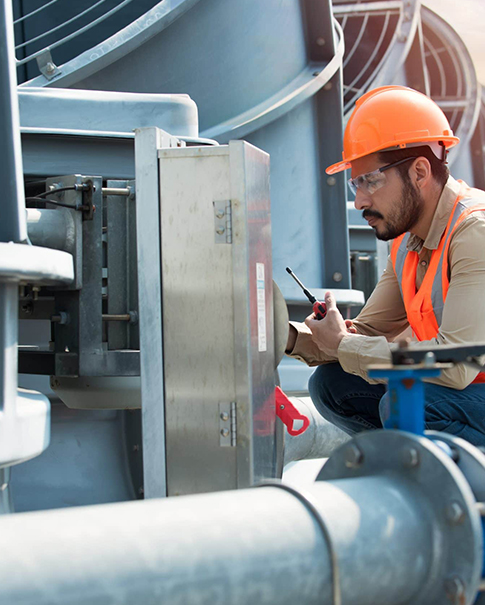Applications of Extruder Mold Temperature Controllers in the Extrusion Industry
Jun 06, 2025
As a high-efficiency plastic processing equipment, extruders hold a vital position in industrial production due to their continuous production capabilities. This versatile machine can meet the molding needs of various materials, making it widely used in industries such as packaging films, construction pipes, automotive seals and parts, and cable sheaths. By accurately controlling temperature and pressure, extruders can flexibly produce diverse products, ranging from micron-level films to complex structural components. This not only ensures high-quality output but significantly enhances production efficiency. With the development of new materials and technologies, the application scope of extruders continues to expand.
Common Applications of Extruder Mold Temperature Controllers in the Extrusion Industry:
1. Plastic Extrusion Field
* Pipe Extrusion: In the production of plastic pipes, mold temperature controllers regulate the temperature of the molds, ensuring that the molten plastic flows evenly and cools properly. This results in pipes with uniform wall thickness, stable dimensions, and smooth surfaces. The reduced ovality and wall thickness deviations improve the pipe's pressure resistance and aesthetic quality, making it suitable for applications in construction water supply and drainage, gas transmission, and electrical cable conduits.
* Profile Extrusion: In the production of plastic profiles for doors, windows, and decorative materials, mold temperature controllers ensure that the molds maintain an appropriate temperature. This allows the plastic to fill the mold cavities more effectively, achieving precise shapes and dimensions. The temperature control also enhances the profile's surface quality and physical properties, such as rigidity and flexibility.
* Sheet Extrusion: For plastic sheet extrusion, precise mold temperature control ensures even distribution of internal stress in the sheet, preventing warping or deformation. It also guarantees the flatness and smoothness of the sheet's surface. High-quality plastic sheets are produced for industries such as construction, furniture manufacturing, and advertising displays.
* Film Extrusion: In plastic film production, mold temperature controllers help regulate cooling rates and crystallinity. This results in films with excellent transparency, tensile strength, and flexibility, as well as uniform thickness. The controlled temperature improves film quality, making it ideal for use in packaging, agriculture, and electronics industries.
2. Rubber Extrusion Field
* Rubber Hose Extrusion: During the production of rubber hoses, mold temperature controllers create a suitable environment that ensures the rubber has excellent flowability and plasticity during extrusion. This results in hoses with precise dimensions and smooth surfaces, enhancing performance in terms of pressure resistance, abrasion resistance, and aging resistance. These hoses are widely used in industries such as automotive, machinery, and chemical engineering for oil, water, and gas transmission.
* Rubber Strip Extrusion: In the extrusion of rubber sealing strips, mold temperature controllers ensure stable extrusion processes, maintaining consistent cross-sectional shapes and stable dimensions. This improves the sealing performance and elasticity of rubber strips, which are crucial for automotive door seals and window seals in construction.
* Rubber Sole Extrusion: For rubber sole extrusion, mold temperature controllers ensure that rubber materials are extruded at optimal temperatures, achieving excellent forming effects and physical properties such as elasticity, abrasion resistance, and slip resistance. This leads to higher quality and comfort in rubber footwear soles.
A rubber products manufacturer that previously used a natural gas boiler for heating faced significant energy waste during equipment downtime. The primary production equipment was a flat vulcanizing machine with heating plates measuring 1.2 meters by 1 meter by 40 millimeters, with six plates in total. The process required that the temperature of each heating plate be precisely controlled at 160°C.
For this production demand, the company selected a rubber extruder mold temperature controller with the following technical specifications: heating power of 60KW, circulating flow rate of 16m³/h, and lift of 30 meters. After more than a year of practical operation, the temperature controller system proved stable and reliable, meeting the demand for continuous production, with each heating plate's temperature achieving the required precision.
With the implementation of mold temperature controller system, the company not only solved the energy waste issue during equipment downtime but also significantly improved product quality and reduced defective rates. This demonstrates the importance of selecting compatible mold temperature control equipment in improving production efficiency and product quality in rubber manufacturing.
3. Cable Extrusion Field
In cable production, extruder mold temperature controllers regulate the extrusion temperatures of cable insulation and sheath materials. By precisely controlling temperature, these systems ensure that insulation and sheath materials exhibit good flowability and uniformity during extrusion, guaranteeing consistent thickness and smooth surfaces. This improves both the electrical and mechanical properties of the cable, ensuring high quality and safety. These systems are widely applied in the production of power cables, communication cables, and various other types of cables.
4. Other Extrusion Applications
* Food Industry: In the extrusion of food packaging films and food processing pipes, mold temperature controllers maintain the temperature within an ideal range. This ensures the safety and stability of food-contact materials, while also stabilizing product dimensions and surface smoothness, meeting food hygiene standards.
* Composite Material Extrusion: When producing fiber-reinforced composite materials, mold temperature controllers help regulate mold temperatures, allowing better integration of resin matrices with reinforcing materials. This improves the performance and quality of composite materials, ensuring that products meet mechanical and thermal requirements.
Nanjing Hengde Electrical Equipment Co., Ltd, a professional manufacturer specializing in mold temperature controllers, produces over 200 models tailored to different industries, including those for the extrusion sector. Hengde offers one-on-one customer service, available 24/7, to meet all your production needs. Hengde's efficient and durable mold temperature controllers can save your company significant maintenance and replacement costs, improving both production efficiency and product quality.
Choose Hengde,Choose Perfect Mold Temperature Controller!
